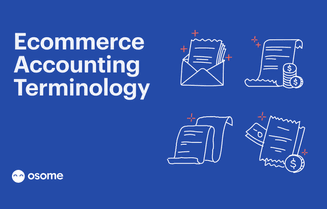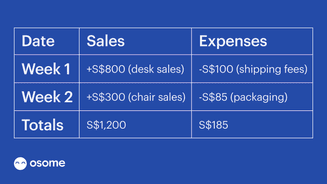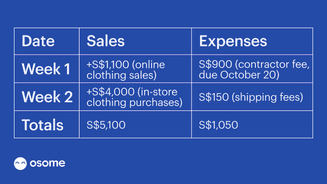- Osome Blog SG
- A Complete Guide to Ecommerce Accounting
A Complete Guide to Ecommerce Accounting
- Modified: 23 May 2025
- 11 min read
- Ecommerce, Money Talk


Osome Content Team
VIP Contributor
Osome has been collaborating with 21 authors from 4 countries. We embrace diversity and are proud that lawyers and founders, journalists and financial analysts choose to work with us.
Ecommerce accounting covers all your financial management as an online seller, from bookkeeping and invoices to record keeping and filing your taxes.
It’s a big task - and one that requires specialist knowledge and takes time. That’s why many ecommerce companies choose to outsource their accounting. These businesses use online accounting providers like Osome to get dedicated support with their books.
If you’re an online seller looking for help, we’ve got you covered. Here’s your guide to ecommerce accounting, why it’s essential and the basics you need to know to get started. Working through these points will help you decide how much help, if any, you need. If you’re in need of professional ecommerce accountants, please don’t hesitate to reach out to us!
What Is Ecommerce Accounting?

Ecommerce accounting refers to the specialised accounting practices and processes tailored to the unique needs of ecommerce businesses. It involves the recording, analysis, and reporting of financial transactions specific to online retail operations. Ecommerce accounting encompasses various aspects, including tracking sales revenue, managing inventory costs, handling digital payment processing, calculating shipping expenses, and monitoring online marketing expenditures.
You need to understand how your ecommerce business is performing and be able to meet the government’s reporting requirements. Accounting empowers you to do that.
Accounting involves monitoring and reporting your financial activity. It includes elements of bookkeeping, management reports and tax filing, which help make sure your business stays compliant.
Given the complexity of the task, most new ecommerce businesses use accounting software. These platforms securely import transactions from your bank. These are categorised in the software, a process called “reconciling”. The data can then be used to produce the reports you need.
For example, you may want to understand the money coming in and out of your business. Cash flow statements show that over a given period of time. Having easy access to that information allows you to make sure you can pay your bills and understand when you can invest in growth.
At Osome, we support businesses using top ecommerce platforms – including Amazon, Shopify, Lazada and others – helping them to grow through smart accounting and financial insights. We do that through a combination of an online accounting platform and a dedicated accountant that supports your business by answering any questions you have.
Ecommerce Accounting Vs Bookkeeping: What’s The Difference?

Bookkeepers record day-to-day financial transactions. These are categorised, so they can be tracked by spending and income type. That information is then fed into reports, either manually when bookkeepers are using spreadsheets or automatically using online software.
Ecommerce accountants analyse, interpret and report on your finances on a monthly, quarterly or annual basis. They also file tax returns. Their role is to take the information that’s been recorded by a bookkeeper and turn it into useful reports and insight.
Many accountants take an advisory role. They use their knowledge of finance and your business to provide feedback and ideas.
Accountants or business owners can take on a bookkeeper’s role. An accountant’s role is more complicated, involves more training and includes activity that’s harder for business owners to do themselves.
Why Accounting Is Important For Ecommerce
To understand your cash flow and profitability - how well your business is performing - you need to stay on top of your ecommerce accounting. That requires having a robust system to manage your incomings and outgoings, so you can meet your tax obligations and manage your business effectively.
It Helps Build A Financially Reliable And Stable Company
Being able to properly understand the money coming in and out of your business is necessary to survive and thrive. Having accurate data allows you to reliably track cash flow, so you can stay on top of that.
Accounting builds on that basic understanding by providing insight, too. Knowing your way around a profit and loss statement, and your balance sheet will help you build a business – accountants can support you with understanding the process.
Accounting Will Help You Forecast
Understanding your business’s financial situation allows you to look ahead, forecast future activity and budget accurately. That process is a critical part of running a business. You want to know how much stock to buy, what cash is available to invest and the likely profit you’ll get.
The better you know the numbers, the easier it is to model different scenarios. For example, you might want to understand how changing raw material costs impact profitability or whether you can afford to hire more staff. If you’re on top of your forecasting, you’ll be able to look at the impact of changing assumptions in your sales, cash flow and profit and loss forecasts.
A Good Accounting System Ensures Your Tax Returns Are Straight Forward
When it comes to filing your tax returns, you need accurate records. Implementing a reliable system ensures you won’t be missing information at this crucial time. It also allows your ecommerce accountant to spot opportunities for tax savings.
Online accounting software simplifies this process. The reports you need to file your tax returns can be created at the click of a button, ready for you and your bookkeeper or accountant to check before they are filed.
Proper Accounting Is Essential If You Want To Sell Your Business Or Raise Investment
Investors need to have confidence in you and your business. Knowing your numbers and being able to present the reports they ask for is critical to the process. Both of those things depend on good accounting.
It’s a similar process when you come to selling a business. Without effective accounting, it’ll be impossible to convince people that are interested in buying your company that it’s a good opportunity.
Understanding What You Should Charge
That means ecommerce companies need to have accurate information about the margins they’re operating on. Setting prices normally involves combining the knowledge of the amount you need to charge to make sufficient margins with an analysis of what’s already in the market.
Forecasting the impact changes in costs and prices are going to have is critical to making sure sales are profitable - and your business is viable - too.
Important Ecommerce Accounting Terminology

Every ecommerce entrepreneur should be familiar with the following accounting terminology. Taking a moment to learn these terms will provide the context you need to understand accounting - and put you on a better footing to run your business and be successful.
Purchase Order
Purchase orders (POs) are created by customers to track what they’re spending money on. It shows a company’s intention to purchase goods or services from a seller. They are normally shared once a sale has been agreed. If you receive a PO from a customer, you should include the PO number on your invoice.
It’s unusual for small ecommerce businesses to create PO numbers for the items they purchase, but you might implement such a system as your company grows.
Sales Order
A sales order is created by an online seller to confirm they can provide the goods or services requested by a customer. It details exactly what will be provided and the costs involved, often including:
- Delivery date and address
- Payment method
- Goods included
- Packaging details
Business to business online sellers, like wholesalers and manufacturers, often use sales orders because of the volume involved. If you’re selling single items online, it’s unlikely that it’s worth creating a system to manage sales orders.
Invoice
An invoice provides proof of purchase of your goods or services to your customers or requests payment for them. Invoices are normally issued before payment is received. It’s important to include:
Your company’s name, contact information and addressThe buyer’s name, contact information and addressPayment detailsDateTax identification number and any tax that’s been includedA description of what they’ve purchased
Similar to sales orders, invoices are most commonly used for online sellers that sell to other businesses. If you process large, complex orders, you might decide to create invoices that allow your customers to check everything and process payments. If you’re selling single items to consumers, it’s unlikely that you’ll need to create invoices.
Receipt
This is a paper or electronic record of a transaction that is generated and given to the customer when a sale is made. Receipts are issued after payment is received. Most online sellers offer receipts.
Types of Accounts
Current Account
A current account is a bank account meant for everyday use and allows you to receive and spend money.
It usually has a low interest rate and offers you easy access to your cash. There’s normally no minimum account balance, though there may be a limit on the number of deposits you can make per month.
Savings Account
A savings account is a bank account meant for long-term use. You can earn interest on your balance, but be aware this is counted as income and is subject to tax. There may also be restrictions on withdrawals from savings accounts.
Businesses might set up a savings account to put money aside for tax and to save towards large investments.
Certificate Of Deposit
A certificate of deposit is issued by a fixed deposit account. It’s an investment account into which you deposit money for a fixed period of time, from one month to five years.
Interest rates are usually higher for these accounts than savings accounts, but penalties are applied for withdrawing the money sooner than the agreed date.
Money Market Account
A money market account is a combination of a current account and a savings account. It offers a higher interest rate than both while allowing you a debit card and the ability to write checks. However, it often requires a minimum balance and limits the number of withdrawals you can make per month.
Types of Financial Statements
There are three main types of company's financial statements: cash flow statements, income statements, balance sheets.
Cash Flow Statements
A cash flow statement shows the money coming into and going out of a business in a certain period of time. The most common format is a monthly view, which shows historic information and a forecast for the future. It’s a key report and the one you’re likely to look at most frequently.
Ecommerce businesses are likely to look six months to a year into the future. Understanding your cash position is critical when making decisions around things like investing in marketing or new stock.
Income Statements
An income statement is also known as a statement of comprehensive income. It includes the revenue, capital gains and losses and financing costs of the company over a period of time. An income statement is another key performance report. It shows how profitable, efficient and sustainable a company is and is incredibly useful for planning.
The structure of an income statement shows how money comes into a company and costs are incurred before finally showing the profit you’re left with. It includes these key headings:
- Revenue: Sales you’ve made
- Cost of Sales: Expenses that relate directly to orders
- Gross Profit: The money you’re left with after the cost of the goods sold
- Expenses: The other investments you make to run the business, such as office costs
- Profit before tax: What you’re left with after covering all of your expenses
- Profit after tax: The amount of money you have once taxes have been paid
Balance Sheets
A balance sheet is also known as a statement of financial position. It shows a business's assets, liabilities and shareholders' equity at a set point in time.
It gives an overview of what your business owns and what it owes, as well as any amount invested. A balance sheet shows a company’s financial position, so you can understand its value.
Similar to an income statement, it’s presented in a logical way. It starts with the assets you own, including cash, property and the money you’re owed. Next it looks at liabilities, such as the money you owe on a bank loan or for stock. The final section includes stockholders’ equity and liabilities.
The Two Types Of Accounting For Your Ecommerce Business
1 Cash-Based Accounting

If your company recognises revenue upon receiving cash and expenses when paying them, use cash-based accounting. This means you record cash entering and leaving your accounts in your books. It works best with single-entry bookkeeping. However, double-entry bookkeeping is fine too.
2 Accrual-Based Accounting

If your business recognises revenue as it’s earned and expenses at the time they’re incurred, use accrual-based accounting.
This means cash doesn’t have to enter or leave your accounts for you to record transactions, so you can recognise sales and purchases on credit immediately. Accrual-based accounting works best with double-entry bookkeeping.
Typical Ecommerce Accounting Tasks

Once you understand accounting and have your accounting systems in place, it’s important to develop a process that allows you to keep on top of the books. There are a number of key tasks that this is likely to include:
- Keep accurate bookkeeping records, including receipts, bills, and bank statements
- Categorise transactions, from sales to expenses (sometimes called “reconciling”)
- Distinguish between returns and chargebacks
- Keep track of cash flow
- Plan inventory
- Update budgets
- Produce and analyse financial statements
- Pay estimated quarterly taxes
- File sales tax
We recommend completing similar tasks at the same time, so you can be more efficient (that’s sometimes called “batching” tasks). It’s also helpful to create your own checklists to work through.
For example, you might have a process to reconcile transactions, check returns and chargebacks, monitor stock and create a sales and cash flow forecast, so you can decide how much stock to order.
Bookkeepers and accountants support this process. They have the expertise required to keep you compliant and save time: it often makes sense for ecommerce companies to get support with these tasks, particularly if you’re growing.
Get ecommerce accounting right! The truth is, as a small business owner, it’s not your job to master accounting. As experts in the ecommerce space, we know a thing or two about getting it right for our clients – join Osome now.
FAQs
Do you need an accountant for an online business?
Unless you have the time and expertise to take care of your own accounting activity, it helps to have dedicated support.
Should you hire an accountant for your ecommerce store?
If you’re ambitious or your business is already growing rapidly, it makes sense to hire an accountant to help you run your ecommerce business.
Not only will accountants save you time, but they could save you money too. A great accountant will help you understand tax law and how to operate your business in an efficient way.
Which accounting software is best for ecommerce?
Look for an ecommerce accounting product that meets your needs. Sell via different platforms? You need consolidated reports. Sell in more than one country? You need to report for VAT in each location.
Looking at customer reviews is a great way to find out what accounting software is best for your business, particularly if the people commenting operate similar companies.
Osome’s software gives you helpful ecommerce insights when you connect your marketplaces, so you can make smarter business decisions.
Why is accounting important for an ecommerce business?
As an online vendor, it’s essential to track all your transactions, understand your sales and costs and file your tax returns on time, so your business remains compliant.
Accounting is essential to meet those basic requirements, it also helps you understand how the business is performing. Being able to produce reports on your cash flow and profitability - and understanding them - is critical to running your business effectively.
Osome’s ecommerce accounting services can support you with all of this. And, our prices are based on your turnover, so you get the right support at the best possible value for money.
Which type of accounting is best practice for online businesses?
Accrual-based accounting and double-entry bookkeeping are best practice for online ecommerce businesses, as you are likely to see complex transactions and sales via credit.
While double-entry bookkeeping is a more complicated approach, accounting software can make the process easier by making it simple to reconcile transactions.






